
Stanley Clarke is an American bassist, composer and founding member of Return to Forever, one of the first jazz fusion bands. Clarke gave the bass guitar a prominence it lacked in jazz-related music. He is the first jazz-fusion bassist to headline tours, sell out shows worldwide and have recordings reach gold status.

Jazz fusion is a popular music genre that developed in the late 1960s when musicians combined jazz harmony and improvisation with rock music, funk, and rhythm and blues. Electric guitars, amplifiers, and keyboards that were popular in rock and roll started to be used by jazz musicians, particularly those who had grown up listening to rock and roll.

George M. Duke was an American keyboardist, composer, singer-songwriter and record producer. He worked with numerous artists as arranger, music director, writer and co-writer, record producer and as a professor of music. He first made a name for himself with the album The Jean-Luc Ponty Experience with the George Duke Trio. He was known primarily for 32 solo albums, of which A Brazilian Love Affair from 1979 was his most popular, as well as for his collaborations with other musicians, particularly Frank Zappa.

Jean-Luc Ponty is a French jazz and jazz fusion violinist and composer.

Hot Rats is the second solo album by Frank Zappa, released in October 1969. It was Zappa's first recording project after the dissolution of the original version of the Mothers of Invention. Five of the six songs are instrumental, while "Willie the Pimp" features vocals by Captain Beefheart. In his original sleeve notes, Zappa described the album as "a movie for your ears".
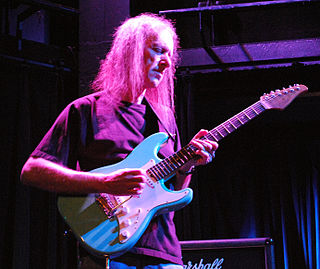
Scott Henderson is an American jazz fusion and blues guitarist best known for his work with the band Tribal Tech. He was born in West Palm Beach and raised in Lake Worth Beach.

Upon the Wings of Music is an album by French jazz fusion artist Jean-Luc Ponty. It was released in 1975 on Atlantic, his first record for the company.
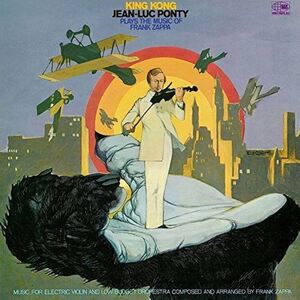
King Kong: Jean-Luc Ponty Plays the Music of Frank Zappa is an album by French jazz fusion artist Jean-Luc Ponty first released in May 1970 on Liberty Records' World Pacific Records subsidiary label and later released on Blue Note.

Imaginary Voyage is a studio album by French jazz fusion artist Jean-Luc Ponty. It features guitarist Daryl Stuermer and bassist Tom Fowler, along with keyboardist Allan Zavod and drummer Mark Craney. It was released in 1976 on Atlantic Records.

Mystical Adventures is an album by French jazz fusion artist Jean-Luc Ponty, released in 1982.
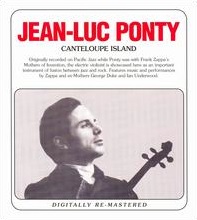
Cantaloupe Island is an album by French violinist Jean-Luc Ponty that was recorded in 1969 and released in 1976 by Blue Note. It combines two previously issued albums: King Kong: Jean-Luc Ponty Plays the Music of Frank Zappa and Jean-Luc Ponty Experience with the George Duke Trio, both recorded in 1969 for the World Pacific label.
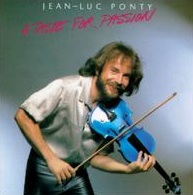
A Taste for Passion is an album by French jazz fusion artist Jean-Luc Ponty that was released in 1979. It was reissued by Atlantic on CD in 1990 and 1992. The track "Beach Girl" received a nomination for Best Rock Instrumental Performance at the 1981 Grammy Awards.

Civilized Evil is an album by French jazz fusion artist Jean-Luc Ponty that was released in 1980. It was reissued by Atlantic on CD in 1992.
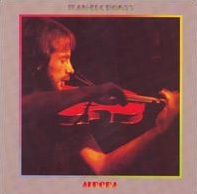
Aurora is a studio album by French jazz fusion artist Jean-Luc Ponty, released in 1976. It features guitarist Daryl Stuermer, keyboardist Patrice Rushen, bassist Tom Fowler, and drummer Norman Fearrington. It was reissued on audio cassette in 1990 and on CD in 1992.

The Gift of Time is an album by French jazz fusion artist Jean-Luc Ponty, released in 1987. It was his first recording for Columbia Records after twelve albums on the Atlantic label. It was reissued on CD in 1991.

Live is a live album by French jazz fusion artist Jean-Luc Ponty, recorded in December 1978 and released on April 18, 1979. It was reissued on Atlantic Records on CD in 1990 and 1992.
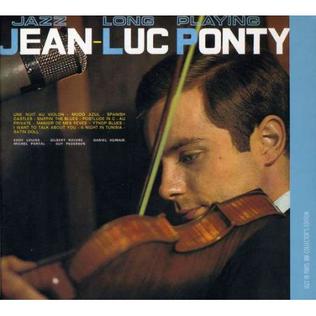
Jazz Long Playing is the debut album by French violinist Jean-Luc Ponty recorded in Paris in June and July 1964. It was reissued in 2000. Jazz Long Playing is one of two albums produced by Ponty; Sunday Walk in 1967 was his second.
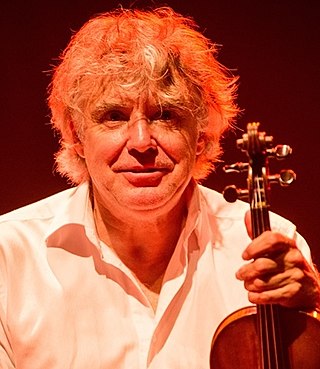
Didier Lockwood was a French violinist. He played in the French rock band Magma in the 1970s, and was known for his use of electric amplification and his experimentation with different sounds on the electric violin.

Electric Connection is one of four American recordings Jean-Luc Ponty made in 1969. In 1969 was it was released on vinyl by World Pacific Jazz and reissued in 1993 on CD by One Way Records.
John William Heard was an American bass player and artist. His recording credits include albums with Pharoah Sanders, George Duke, Oscar Peterson, Count Basie, Zoot Sims, Ahmad Jamal, Frank Morgan, George Cables. His professional jazz performance career lasted from the 1960s to the early 2010s, during which he also worked as a visual artist, producing drawings, paintings, and sculptures.



















